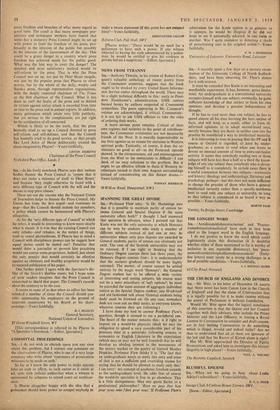SIR,—I recently spent a few days on a cursory exam-
ination of the University College of North Stafford- shire, and have been observing Dr. Flew's claims for it with interest.
It must be conceded that Keele is an interesting and worthwhile experiment. It has, however, grave limita- tions. An undergraduate at a conventional university occupies himself with one subject; eventually, he gains sufficient knowledge of that subject to form his own opinions, and develop a genuine independence of thought.
If he has to read more than one subject, he has to spend almost all his time learning the bare outline of facts, and will tend, as a result, either to form ill- informed opinions or to adopt second-hand ones, merely because they are there; in neither case can the practice be considered a way to intellectual maturity.
It is interesting to note in passing that the PP and B course at Oxford is regarded, at _least by under- graduates, as a course to read when one wants to devote an unusual amount of time to extra-curricular activity. It seems that somebody reading two or three subjects will have less than a half or a third the know- ledge of any one subject than somebody who is devot- ing himself to it completely. In certain cases there is a useful connection between two subjects—economics and history, theology and anthropology, literature and psychology perhaps—but this does not seem sufficient' to change the practice of those who have a general intellectual curiosity rather than a specific academia bent to read only one subject at university, as long as that subject is considered in as broad a way as possible.--Yours faithfully,
MARTIN PAGE










































 Previous page
Previous page